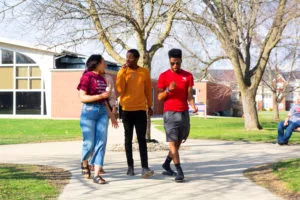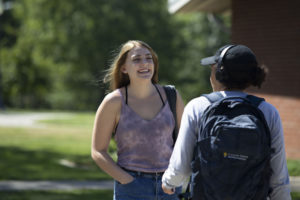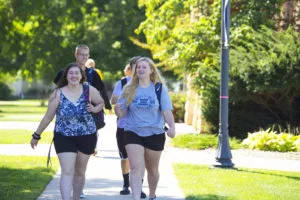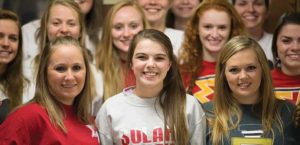In 2017, just as President Draves was in her first year, Graceland’s leadership consciously identified five principles of retention, which were formally adopted in summer of 2018. Those principles — belonging, engagement, personal support, perceived value of curriculum, self-efficacy — helped to frame the approach to what came next. Graceland began a new initiative aimed at addressing the issue of retention head on: the Belongingness Net.
Borne out of an idea from a Student Life retreat and championed by members of the Student Success Task Force — a cross-departmental team of faculty and staff ranging from academics to athletics to residence life and more — the net puts a formal framework around many things that are already in place. Now, there are over 30 “strands” in the net — each one with a champion, an anchor in at least one of the five principles of retention and the support of colleagues.


THE STRANDS
One of the strands in the net is Graceland’s robust collection of student clubs. There are over 40 different organizations that students can join covering an extremely wide variety of interests, from disc golf to history to robotics to Broadway dance!
“It is important for students to be able to find something they can belong to,” said Dave Schaal, vice president for Student Life and dean of students, who co-chairs the Student Success Task Force with Assistant Professor of English Catherine Clifford, PhD.
Here are some strands…
Peer Mentors
Housing System
Student Success Studio
Clubs & Organizations
Broader Representation in Dining
Cultural & Ethnic Organizations
Interactive Game Room
Worship & Spiritual Development
Internships
Leadership Opportunities
Enriched Disability Services
New Student Orientation Programming
Tutoring
Writing Center
Career Services
THE FRAMEWORK
Part of the Belongingness Net’s initiative is to help assess which strands are effective and which need tweaking. This is especially important for the programs that were integrated into the Belongingness Net that already existed but no longer have to stand on their own. By putting a framework in place, it is easier to see patterns in places where efficiencies can be realized, as well as where there are gaps that need to be filled.
“Before, you just had 30 things that operated independently,” Schaal said. “But when you give the leaders of these initiatives the opportunity to ask, ‘how are we going to do this in a way that’s retention-effective with specific objectives that are measurable?’ — now all of a sudden you have a net that’s hanging together because everything is doing all their individual things in a slightly different way.”
MEASURING SUCCESS
Graceland’s housing system is an important aspect of helping students to find their sense of belonging and is always looking for ways to evolve and improve. Having a method for measurement will be helpful in analyzing any potential changes that may need to be made to ensure that the housing system works for as many students as it can.
The housing system is one of the great successes of Graceland’s history (for more about its origins, check out the story A Lifelong Impact in this issue), but as with most progress, it is important to continue to assess how successful the housing system is in meeting the dynamically changing needs of an increasingly diverse student population. The Belongingness Net hopes to provide the ability for successful initiatives like the housing system to find ways to be nimbler so that Graceland can adapt quickly.
THE ULTIMATE GOAL
Schaal states often that the majority of the programs inside the Belongingness Net existed already. And, in truth, not a single student would know what you’re talking about if you asked them, “What’s the Belongingness Net?” That’s by design. The net needs to be woven into the fabric of everyday life at Graceland in order to be most effective. The ultimate goal that connects the strands of the Belongingness Net really resides in a question that organizations and projects need to try and answer: “How would we do this if our primary objective was student success?”
Schaal smiles when we begin to talk about the impact of Newcom Student Union on the Belongingness Net. “One of the things we heard from students was that there wasn’t enough small-group study space on campus,” Schaal said. Newcom Student Union aims to address that and significantly increase seating throughout the building, creating new spaces for collaboration. Academic success and retention are highly related, so it is important to foster teamwork through physical space.
For many students, having a place to blow off steam and connect over a game of pool or foosball can be a welcome respite amidst the busyness of student life. The relocation of the game room outside of the main room means that it can be open even when there are events being held that would have previously prevented access to the games on the main room floor. These conveniences and more will make a big impact on student satisfaction.
The Student Success Task Force is constantly thinking about ways to put student success and satisfaction at the forefront. The Belongingness Net hopes to continue to catch students and find ways that Graceland can connect in this changing world.
“It is important for students to be able to find something they can belong to.”
–Dave Schaal, PhD, `80
40+
clubs and organizations
5
principles of retention
30+
strands in the net
Horizons - Summer 2019
July 7, 2019
Remembering the time of your life OCT. 25-27, 2019 For more details...
Horizons - Summer 2019
July 7, 2019
As the Horizons team spent time looking through old Acacia yearbooks, we noticed a recurring theme that holds true after all these years: the MEMORIAL STUDENT CENTER has become the beating heart of the student life experience. Here are some gems from the past.
Horizons - Summer 2019
July 7, 2019
At the heart of the Newcom family is a...
Horizons - Summer 2019
July 7, 2019
COMPETITIVE PROGRAMS SADDLE UP Graceland added a COMPETITIVE INTERCOLLEGIATE RODEO PROGRAM...
Horizons - Summer 2019
July 7, 2019
So many of the Graceland family I’ve met with...
Horizons - Summer 2019
June 7, 2019
Send Us Your News Completed a degree program? Published a...

